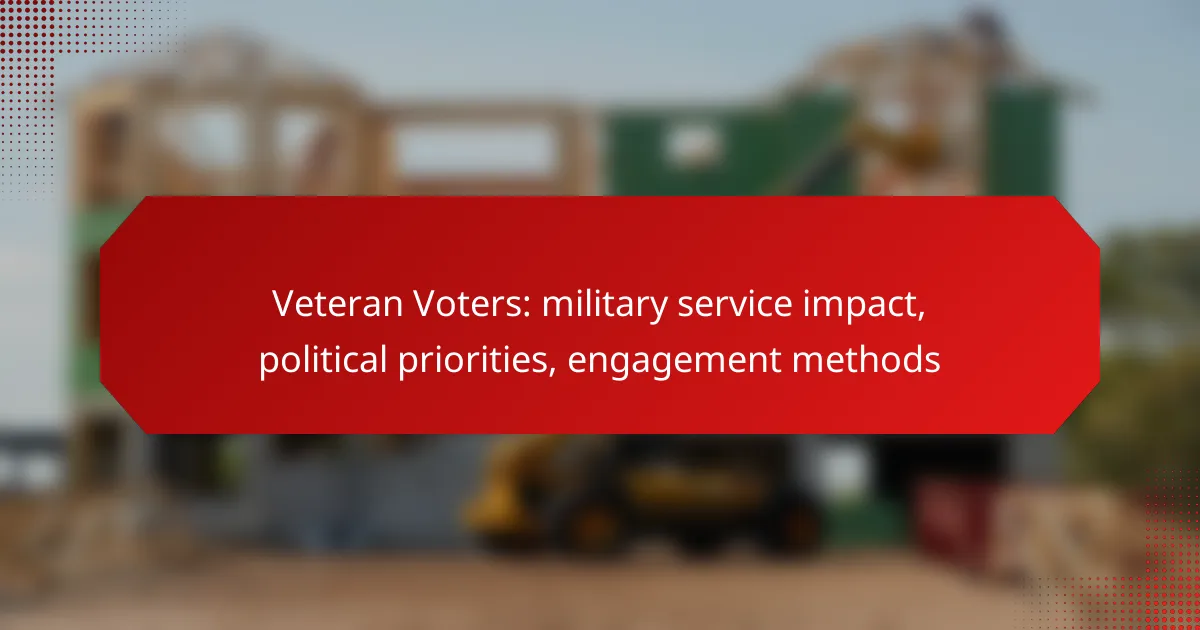Veteran voters are uniquely influenced by their military service, which shapes their political priorities around issues like healthcare, benefits, and national security. Engaging this demographic effectively requires targeted outreach and online platforms that facilitate their participation in the electoral process, addressing barriers such as awareness of voting rights and access to polling places.
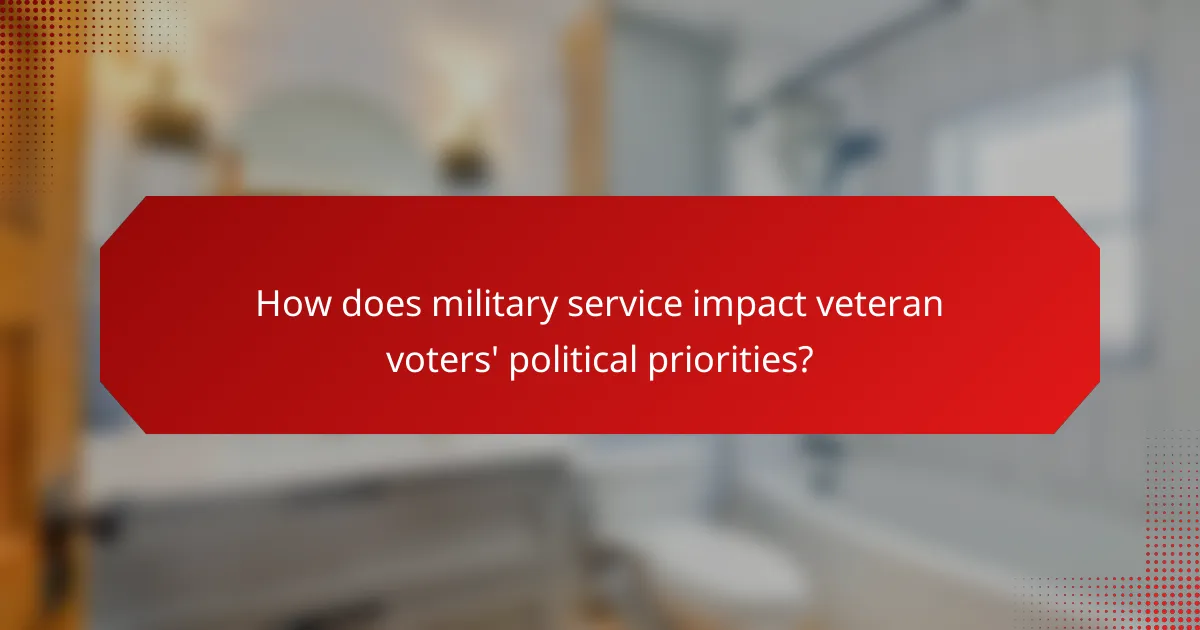
How does military service impact veteran voters’ political priorities?
Military service significantly shapes veteran voters’ political priorities by instilling a strong sense of duty and community. Veterans often prioritize issues that directly affect their well-being and that of their fellow service members, such as healthcare, benefits, and national security.
Influence of service experience on policy views
Veterans’ service experiences often lead to distinct policy views, particularly regarding defense spending and veterans’ affairs. Many veterans advocate for increased funding for healthcare services, mental health support, and job training programs, reflecting their firsthand knowledge of the challenges faced by service members.
Additionally, the camaraderie developed during service can influence veterans to support policies that promote community and family support systems. This shared experience often translates into a preference for candidates who prioritize veteran issues and demonstrate a commitment to service members’ welfare.
Key issues for veteran voters
Key issues for veteran voters typically include access to quality healthcare, job opportunities, and education benefits. The GI Bill, for example, remains a critical factor in enabling veterans to pursue higher education and vocational training, making it a top priority in elections.
Another significant concern is mental health support, as many veterans face challenges such as PTSD. Policies aimed at improving mental health resources and reducing stigma around seeking help are crucial for this demographic. Overall, veteran voters tend to rally around candidates who address these pressing issues effectively.

What engagement methods are effective for veteran voters?
Effective engagement methods for veteran voters include community outreach programs and online platforms tailored for voter mobilization. These strategies help connect veterans with the political process and ensure their voices are heard.
Community outreach programs
Community outreach programs are designed to engage veteran voters through local events, workshops, and informational sessions. These initiatives often involve partnerships with veteran organizations, providing a platform for veterans to discuss their political priorities and concerns.
Successful outreach can include hosting town hall meetings, providing resources on voting rights, and facilitating discussions on issues that matter to veterans. Engaging veterans in their communities fosters a sense of belonging and encourages participation in the electoral process.
Online platforms for voter mobilization
Online platforms for voter mobilization leverage social media, email campaigns, and dedicated websites to reach veteran voters effectively. These platforms can provide information on registration deadlines, polling locations, and candidate positions on veteran issues.
Utilizing targeted ads on social media can significantly increase engagement among veterans. It’s crucial to ensure that the content is relatable and addresses the unique needs of veterans, such as healthcare, benefits, and employment opportunities. Regular updates and reminders can help maintain interest and encourage turnout on election day.
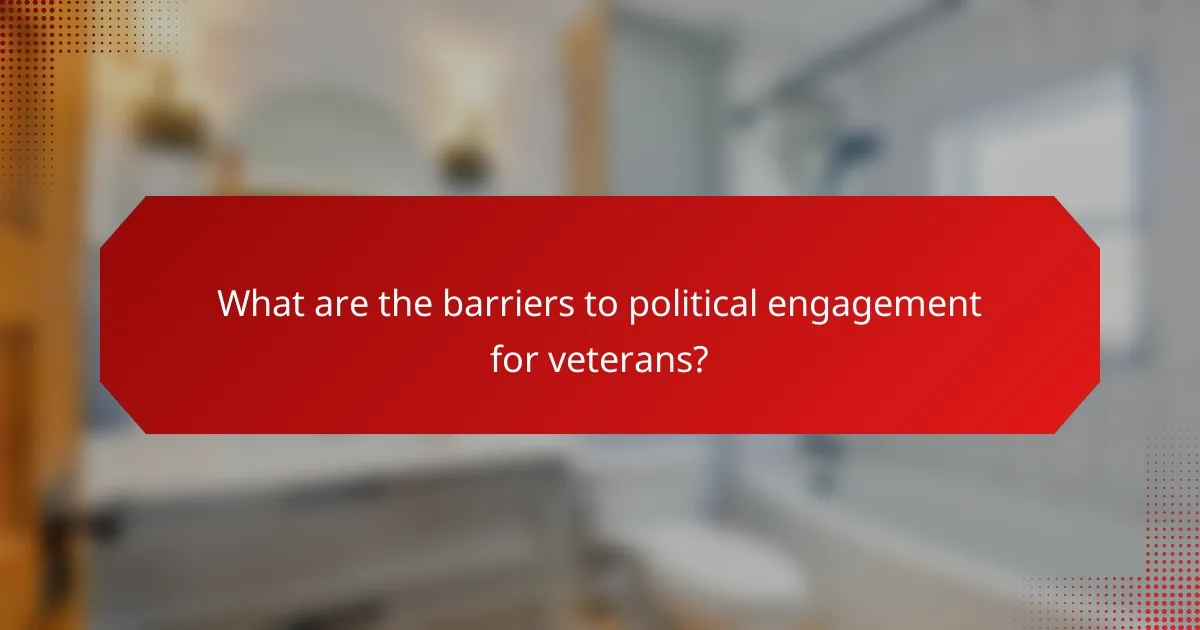
What are the barriers to political engagement for veterans?
Veterans face several barriers to political engagement, including a lack of awareness about their voting rights and challenges in accessing polling places. These obstacles can significantly hinder their participation in the democratic process.
Lack of awareness about voting rights
Many veterans are not fully informed about their voting rights, which can lead to lower participation rates. This lack of awareness may stem from insufficient outreach or education regarding the specific rights and protections afforded to them under laws such as the Uniformed and Overseas Citizens Absentee Voting Act (UOCAVA).
To improve awareness, organizations can provide clear, accessible information about voting rights, including deadlines and procedures for registration and absentee voting. Veterans should seek resources from local veteran affairs offices or trusted veteran organizations to stay informed.
Challenges in accessing polling places
Accessing polling places can be particularly difficult for veterans, especially those with disabilities or those living in rural areas. Physical barriers, such as inadequate transportation options or polling locations that are not wheelchair accessible, can deter veterans from voting.
To mitigate these challenges, veterans should explore options like mail-in ballots or early voting, which can provide more flexibility. Local election offices can also assist by offering information on accessible polling locations and transportation services available on election day.

How can political campaigns effectively reach veteran voters?
Political campaigns can effectively reach veteran voters by employing tailored messaging and building strong partnerships with veteran organizations. Understanding the unique experiences and priorities of veterans is crucial for engaging this demographic.
Targeted messaging strategies
Effective messaging for veteran voters should focus on issues that resonate with their experiences, such as healthcare, job opportunities, and benefits. Campaigns should use clear, direct language that reflects the values and concerns of veterans.
Utilizing testimonials from fellow veterans can enhance credibility and relatability. Campaigns might consider using various media channels, including social media, to share these messages, ensuring they reach veterans where they are most active.
Partnerships with veteran organizations
Collaborating with established veteran organizations can significantly enhance a campaign’s outreach efforts. These organizations often have direct access to veteran communities and can provide valuable insights into their needs and priorities.
Campaigns should seek to engage with local veteran groups through events, sponsorships, or informational sessions. This not only builds trust but also demonstrates a genuine commitment to addressing veteran issues.
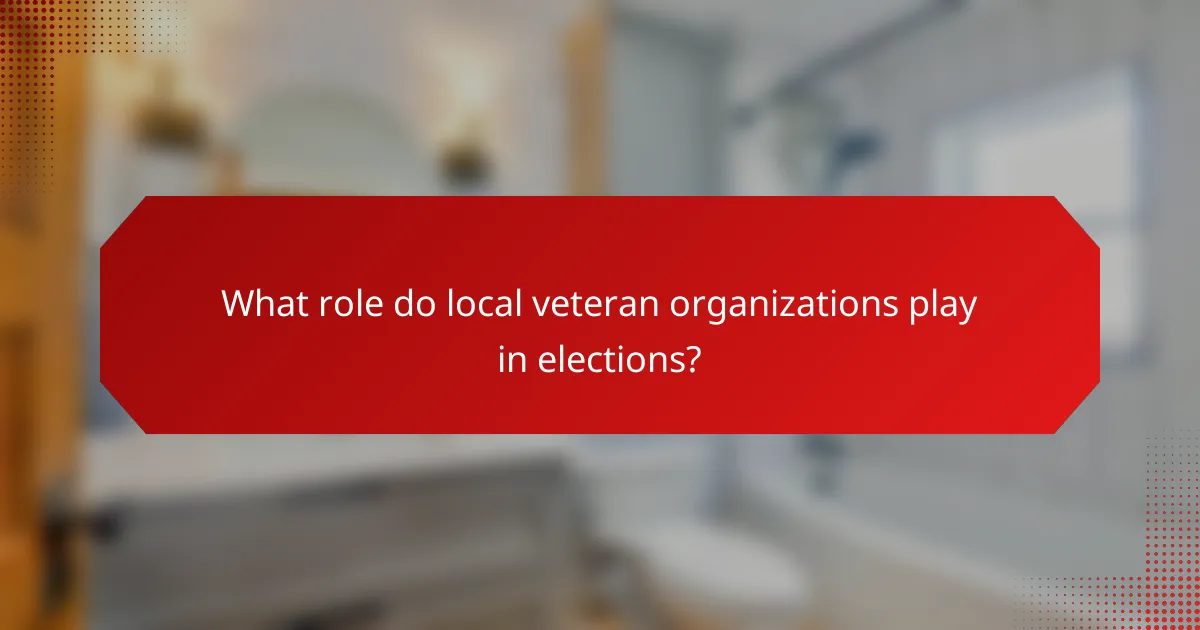
What role do local veteran organizations play in elections?
Local veteran organizations play a crucial role in elections by mobilizing veteran voters and advocating for issues that matter to them. These organizations provide resources and support to ensure that veterans are informed and engaged in the political process.
Voter education initiatives
Voter education initiatives by local veteran organizations focus on informing veterans about their voting rights, the electoral process, and key issues affecting their communities. These initiatives often include workshops, informational pamphlets, and online resources tailored to veterans’ unique needs.
For example, organizations may host seminars that cover how to register to vote, understand ballots, and locate polling places. They might also provide information on candidates’ positions regarding veteran affairs, which helps veterans make informed choices.
Facilitating candidate forums
Local veteran organizations often facilitate candidate forums to create direct dialogue between veterans and political candidates. These forums provide a platform for candidates to present their policies and answer questions specifically related to veteran issues.
Such events typically encourage participation by allowing veterans to voice their concerns and priorities. Organizations may also promote these forums through social media and community outreach to maximize attendance and engagement.
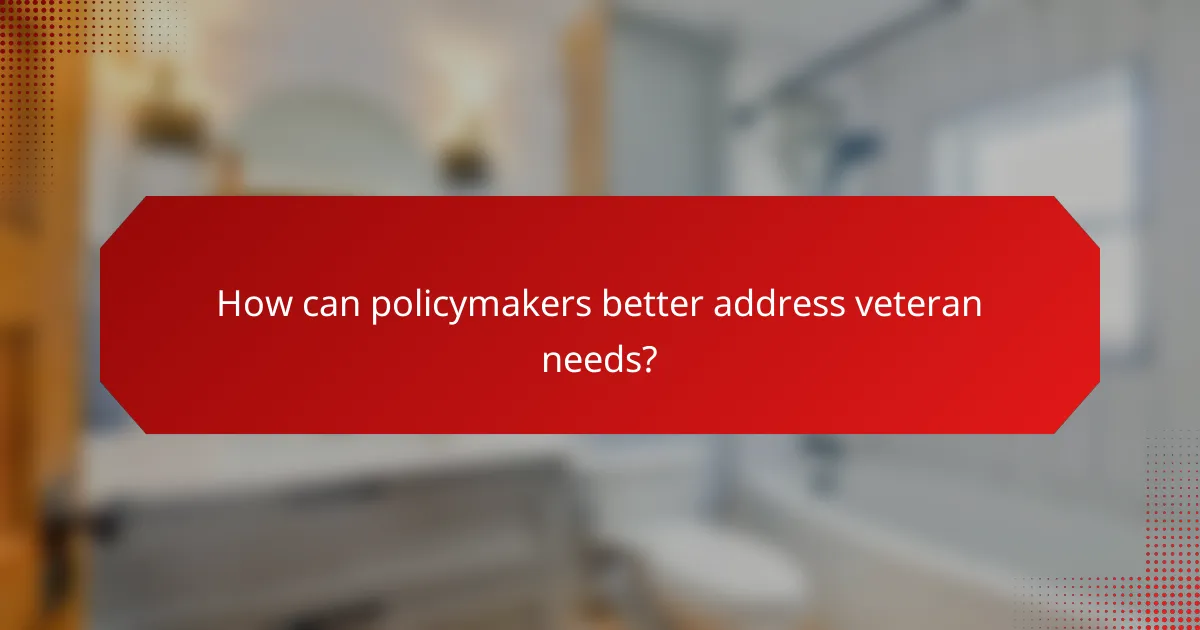
How can policymakers better address veteran needs?
Policymakers can better address veteran needs by prioritizing legislation that directly impacts their quality of life and by actively seeking input from veterans themselves. This approach ensures that policies are relevant and effectively target the unique challenges faced by those who have served in the military.
Legislative advocacy for veteran issues
Legislative advocacy involves pushing for laws and regulations that specifically benefit veterans, such as improved healthcare access, job training programs, and housing assistance. Advocacy groups play a crucial role in this process by raising awareness and mobilizing support among lawmakers and the public.
Policymakers should consider collaborating with veteran organizations to identify pressing issues and develop targeted solutions. For example, initiatives that streamline the claims process for veterans seeking benefits can significantly enhance their experience and satisfaction with government services.
Incorporating veteran feedback in policy-making
Incorporating veteran feedback in policy-making ensures that the voices of those affected by legislation are heard and considered. This can be achieved through surveys, focus groups, and public forums where veterans can share their experiences and suggestions for improvement.
Effective feedback mechanisms can lead to more relevant policies. For instance, if veterans express a need for mental health resources, policymakers can prioritize funding for mental health programs tailored to veterans’ specific needs. Regularly engaging with veterans helps create a responsive and responsible policy environment.

What emerging trends are shaping veteran voter engagement?
Emerging trends in veteran voter engagement are increasingly influenced by technology and shifting political priorities. Veterans are utilizing digital tools for information and mobilization, while their political concerns are evolving to reflect contemporary issues such as healthcare and employment.
Increased use of digital tools
The rise of digital platforms is transforming how veteran voters engage with political processes. Social media, mobile apps, and online forums allow veterans to connect, share information, and mobilize for causes that matter to them.
For instance, organizations like VoteVets leverage social media to raise awareness about veteran issues and encourage participation in elections. Veterans can easily access resources and information about candidates and policies that directly impact their lives.
However, while digital tools offer convenience, they also present challenges such as misinformation. Veterans should verify information from credible sources and engage in discussions that foster informed decision-making.
